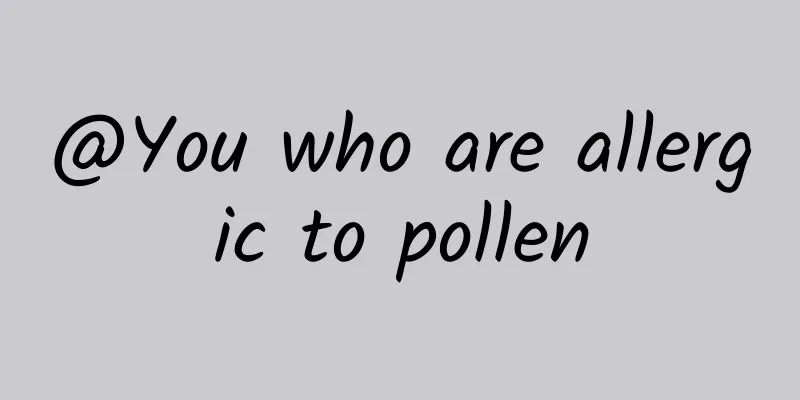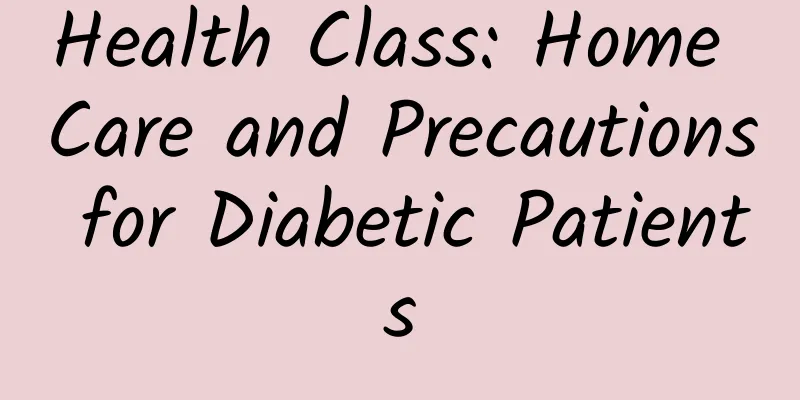@You who are allergic to pollen

|
This is the 3099th article of Da Yi Xiao Hu "The spring scenery fills the garden and cannot be contained; a red apricot branch bursts out of the wall" ——Ye Shaoweng, "Not Worth Visiting the Garden" "The path to Huang Si Niang's house is full of flowers, thousands and thousands of them weigh down the branches" ——Du Fu, "Walking Alone by the River in Search of Flowers" Spring is back, and the mountains are full of flowers, colorful and beautiful. There is not only a red apricot, but also three lives, three worlds, ten miles of peach blossoms. This scene is beautiful. But in this beautiful season of revival, many people will experience a series of allergic symptoms, not only unable to enjoy the joy of spring, but also suffering. However, the culprit of all this is pollen. Have you been @ed? @You, allergy symptoms, you should know There are still many people who are allergic to pollen who mistakenly think they have a cold or rhinitis, and repeatedly use anti-cold drugs or rhinitis drops for treatment, thus delaying the best time for treatment. Therefore, correct diagnosis is the first step. Clinically, there will be the following manifestations: One is "allergic dermatitis", with erythema, papules, small scales, itching or burning sensation. The second is "pollen allergic rhinitis", which includes itchy nose, sneezing, runny nose, nasal congestion, and difficulty breathing. The third is "pollen allergy asthma", which is characterized by paroxysmal cough, dyspnea, white foamy mucus, sudden asthma attacks and gradual worsening. After recovery, the patient is no different from a normal person. The fourth is "pollen allergic conjunctivitis", which is characterized by itchy eyes, swollen eyelids, and often accompanied by watery or purulent mucus secretions. @You, use the medicine correctly, you need to know 1. Take medication in advance Those with a history of allergies need to take medication one or two weeks in advance Those with a history of allergies can use anti-allergic drugs in advance under the guidance of a doctor. At present, the efficacy of anti-allergic drugs on the market is mostly similar, with antihistamines being the main ones. For example, loratadine tablets are a long-acting antihistamine used to relieve symptoms of allergic rhinitis, such as sneezing, runny nose, burning sensation, etc. It can also be used to relieve various other allergic symptoms. Those with nasal allergy symptoms can also use nasal hormones or sodium cromoglycate, and those with asthma can inhale hormones or sodium cromoglycate orally for prevention. Those with a history of allergic conjunctivitis should take medication two or three months in advance. Allergic conjunctivitis is the most common type of allergic eye disease. Plant pollen is the main "culprit" causing the disease. It can be treated and prevented by taking medication two or three months in advance. Eye drops for the treatment of allergic conjunctivitis should be used frequently by patients during the allergic period, and the course of treatment sometimes needs to be started several months in advance. 2. Symptomatic medication Patients who have already developed the disease should use some drugs to treat the symptoms. In addition to continuing to use the above drugs, oral antihistamines can be taken to relieve symptoms. For those with skin allergy symptoms, topical corticosteroid ointment can be used. When asthma attacks, antiasthmatic drugs such as β2 agonists and salbutamol can be inhaled orally. Severe cases require hospitalization. 3. If the symptoms are more obvious or last longer, refuse to use hormone nasal sprays or inhaled hormones, and undergo immunotherapy, also known as desensitization therapy. @You, daily care, you need to know 1. Avoid contact Pollen is an unavoidable allergen. It is best to stay indoors during the onset season and close doors and windows to reduce the entry of outdoor allergenic pollen. When it is necessary to go out, you can use masks, hats, sunglasses, etc. to reduce eye and respiratory contact with pollen. 2. Daily Diet Strengthen nutrition, eat more light food, food containing vitamins. Try to eat less high-protein, high-calorie food, and less irritating food and processed food. Stimulating foods can aggravate pollen allergies Generally speaking, spicy food can dilate blood vessels, cause skin redness, and aggravate pollen allergies, so people with pollen allergies should avoid eating it. In addition, you should also stay away from some irritating foods that cause allergies, such as mutton, sweets, alcohol, and other foods. High-protein diet aggravates pollen allergies With the improvement of living standards, people consume more high-protein, high-calorie foods such as eggs and meat products, which results in the body's ability to produce antibodies, making it more likely to have allergic reactions when encountering antigens such as pollen. In addition, avoid eating allergenic foods such as fish, shrimp, and crab, which contain a lot of heteroproteins and can also cause allergies. Author: Jin Liangyan, Xixi Hospital Affiliated to Zhejiang Chinese Medical University Wang Jianping, First Affiliated Hospital |
<<: What are the benefits of royal jelly for women? What does royal jelly taste like?
>>: If a child has this disease, no matter how many training classes he takes, it will be useless!
Recommend
What kind of pregnant women will have group B streptococcus
As for group B streptococcal infection in pregnan...
Clinical manifestations of right adnexal cyst
The main type of right adnexal cyst is ovarian cy...
What causes urinary tract infection in girls
Urinary tract infections are generally more commo...
Should I drink brown sugar or black sugar during my menstrual period?
Most people are familiar with old brown sugar, an...
What can be made with cornmeal alone (steamed bread, cornmeal pot stickers, cornmeal cakes, etc.)
...
If you don't vomit during pregnancy, you are stupid
Vomiting is the most common reaction during pregn...
When is the best time to get the HPV vaccine?
Many people will learn about the vaccination requ...
Can I eat black rice during confinement?
Although we don't often eat black rice in our...
Can I eat pork chops during menstruation?
Pork chops are actually another way to eat pork. ...
How many days after the double J tube is removed can I have sex?
The double J tube is a thermoplastic elastic uret...
Can I still grow taller after my period?
Generally speaking, when a girl has her period, i...
What to do if you vomit in the morning during pregnancy
We know that pregnancy is a very difficult proces...
Why is my belly still so big after giving birth?
Women must pay attention to their diet after givi...
What are the misunderstandings about osteoporosis prevention in women?
I guess everyone knows that osteoporosis is a com...
This thing is definitely good for healthy women
Premature ovarian failure is something every woma...









